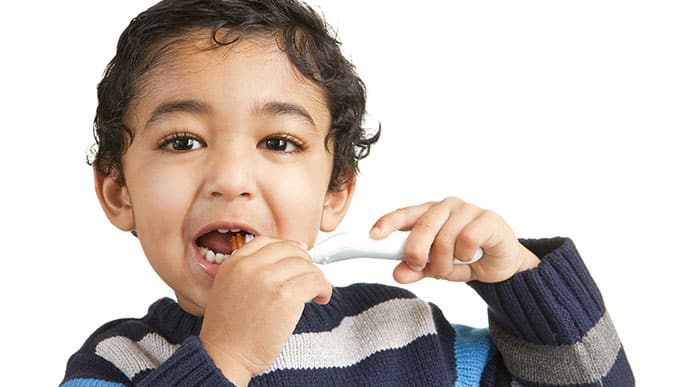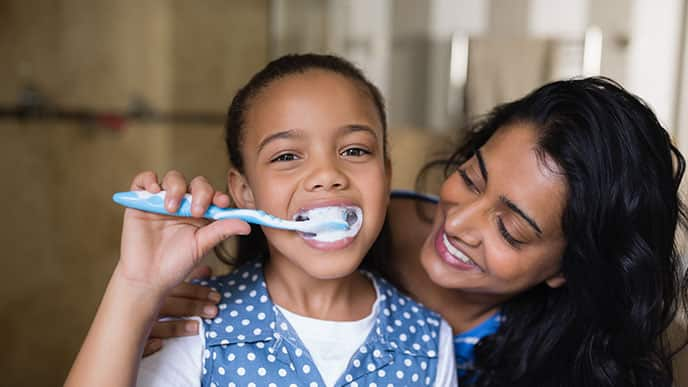If you are a parent, you might constantly ask, “When can kids brush their teeth by themselves?” Knowing when to start this important routine can help your child’s teeth stay healthy. Continue reading to learn why it is important to start early and get some practical tips for keeping your child’s teeth healthy.
When Should You Begin Brushing Baby Teeth?
The journey begins even before their first tooth emerges, with gentle cleaning of their gums. Introducing oral hygiene habits early is crucial for your child’s dental health. As those tiny teeth start to appear, typically around 6 months of age, it is time to initiate brushing baby teeth. Starting early lays the groundwork for a lifetime of healthy dental habits. Let us explore when to start brushing baby teeth and how to begin this essential routine.
Birth to 1 Year Old
During the first year of your baby’s life, dental care revolves around laying the foundation for healthy teeth and gums. Even before their first tooth appears, keeping their mouth clean is essential. After each feeding, gently wipe your baby’s gums using a clean, moist gauze pad or soft damp washcloth to prevent bacteria buildup. As your baby’s first tooth erupts, usually around six months of age, continue the practice of cleaning their gums after feedings.
Additionally, you can introduce a baby toothbrush with soft bristles and a small head at this stage. Brushing their gums and any emerging teeth with water helps them get used to the brushing sensation and establishes a daily routine. You may try using Colgate Toothbrush for Kids (0-2 years), specially crafted for kids who are learning to brush. Its extra-soft bristles effectively and gently clean children’s developing teeth and gums, and its small head helps with easy access into the child’s mouth.
1 Year to 3 Years Old
By the age of 2, your child may enjoy handling a toothbrush, but they might still need more coordination to brush effectively. To help them, you may continue brushing their teeth twice daily with a soft-bristled toothbrush, using a gentle back-and-forth scrubbing motion. The Indian Dental Association suggests using just a smear of fluoridated toothpaste for children under the age of two and a pea-sized amount for children over two years of age. Make sure your child spits out the excess toothpaste after brushing if you are using fluoridated toothpaste.
Parents should supervise their child’s tooth brushing and use only a smear or pea-sized amount of fluoride toothpaste until they are about seven years old. If your child’s teeth are touching, it is time to start flossing between them. Teaching your little one to floss is crucial for their oral health, although they may not master it until around 9 or 10 years old. In the meantime, you can use dental flossers to help keep the children’s teeth clean and improve their oral health.
4 to 5 Years Old
Between the ages of 4 and 5, children start to become more independent, making it a good time to introduce them to proper oral care. By now, most kids have all their baby teeth, so keeping them clean and healthy is crucial. Encourage your child to brush their teeth twice a day with fluoride toothpaste. Help them brush all around their mouth and remind them to spit out the toothpaste after they are done.
Since they may still be learning, it is important to supervise their brushing to ensure they are doing it correctly. You may need to brush their teeth again, especially at bedtime, to ensure thorough cleaning of the surfaces of the teeth. Remember to replace their toothbrush every 3 months or so, or when it looks worn and the bristles are no longer straight. Regular dental check-ups are also crucial at this age. Schedule visits every six months for a cleaning and to ensure their teeth are healthy.
7 to 8 Years Old
As children enter the ages of 7 to 8, it remains crucial to reinforce good oral healthcare habits and provide guidance for proper dental care. By now, they should have developed the coordination and skill to effectively brush their own teeth, transitioning from the phase of brushing baby teeth. However, it is still important to supervise their brushing to ensure they cover all areas of their mouth and brush for the recommended duration. At this stage, your child will no longer need an infant toothbrush.
Dentists advise periodically checking the effectiveness of your child’s brushing. One method is using disclosing tablets, which stain areas of the teeth with plaque missed during brushing. In addition to baby brushing teeth, consider introducing the practice of flossing to your child’s dental routine during this period. While they may need assistance initially, teaching them proper flossing techniques is essential for maintaining healthy gums and preventing cavities. Also, do not forget to schedule regular dental check-ups, as they are crucial during these years.
How Do You Brush a Baby's Teeth?
If you are unsure about how to brush your baby’s teeth, here is a detailed step-by-step walkthrough to assist you. Making sure your baby’s teeth are clean is crucial for their overall health, and by using the right methods, you can establish habits that will benefit them for life. Here is a comprehensive breakdown of how to brush baby teeth effectively:
- Choose the right toothbrush: Use an infant toothbrush with soft bristles and a small head. Avoid toothbrushes with hard bristles and opt for a baby teeth brush, as they can damage your baby’s delicate gums.
- Brush gently: Place your baby in a comfortable position and gently brush their teeth and gums using small circular motions. Pay special attention to the gum line, where plaque tends to accumulate.
- Brush twice daily: Aim to brush your baby’s teeth twice a day, preferably after breakfast and before bedtime. Brushing baby teeth after meals helps remove food particles and bacteria, reducing the risk of tooth decay.
- Use the right toothpaste: Once your child is old enough to use toothpaste, put a tiny smear on the toothbrush. Make sure to use toothpaste specifically formulated for infants and toddlers, as adult toothpaste may contain too much fluoride if swallowed, which could potentially harm their developing adult teeth.
For instance, you may try using Colgate Toothpaste for Kids, which is specifically designed with a 50% less abrasive formula than regular adult toothpaste. It comes in a natural flavour and contains no artificial preservatives, flavours, colours, or sweeteners. It protects your kid’s mouth from cavities, plaque, enamel problems, and bad breath.
Tips for Brushing Baby’s Teeth
Brushing your baby’s teeth can sometimes be a challenge, but with the right approach, it can become a positive and enjoyable experience for both you and your baby. Here are some helpful brushing techniques for child to make tooth brushing easier and more effective:
- Start Early: Begin cleaning your baby’s mouth even before their first tooth emerges. Use a clean, damp cloth or gauze pad to gently wipe their gums after feedings. This helps remove bacteria and gets your baby accustomed to oral hygiene from an early age.
- Make It Fun: Turn toothbrushing into a fun and interactive activity by singing songs and using a toothbrush with bright colours or their favourite cartoon character. The more enjoyable the experience, the more likely your baby will cooperate during toothbrushing.
- Lead by Example: Let your baby see you brush your teeth regularly. Babies and young children often mimic their parent’s behaviour, so demonstrating good oral hygiene habits sets a positive example for them to follow.
- Be Patient and Gentle: Toothbrushing may take time for your baby to get used to, so be patient and gentle. Use soft, circular motions to brush their teeth and gums, and avoid rushing through the process.
To conclude, understanding the right time to begin brushing baby teeth is crucial for establishing proper oral hygiene habits from the start. You can establish a solid foundation for your baby’s dental care by beginning early and following the right steps. Ensuring you have the right baby toothbrush and toothpaste can significantly impact your child's oral hygiene routine. Remember, prioritising oral hygiene from the first emergence of teeth sets the stage for healthy permanent teeth and gums as your child grows.
Frequently Asked Questions
- What happens if you don't brush baby teeth?
If you don’t brush baby teeth, bacteria, and plaque can build up on your baby's teeth and gums, increasing the risk of tooth decay, cavities, and gum disease. Brushing baby teeth regularly and practising proper oral hygiene are essential for maintaining the health of baby teeth and promoting overall oral health in children. - How do I brush my 1 year old's teeth?
Paediatric dentists suggest using a soft-bristled baby teeth brush dampened with water and a tiny smear of fluoride toothpaste, about the size of a grain of rice. You can also find finger brushes, which are helpful tools for cleaning your baby's teeth and gums. - How can I clean my baby's teeth naturally?
Once your baby reaches around 3 months of age, you can begin gently wiping their gums twice a day with a damp, clean face washer cloth or gauze. This prepares them for brushing once their first tooth emerges. As soon as that first tooth appears, you should start cleaning it using a soft infant toothbrush specifically designed for children under 2 years old. - What is the best way to brush a kid's teeth?
The best way to brush a kid's teeth is to use a soft-bristled toothbrush with fluoride toothpaste, brushing gently in circular motions for at least two minutes twice daily. Supervise younger children to ensure proper technique and make brushing teeth for kids a fun and regular part of their daily routine.
This article is intended to promote understanding of and knowledge about general oral health topics. It is not intended to be a substitute for professional advice, diagnosis or treatment. Always seek the advice of your dentist or other qualified healthcare provider with any questions you may have regarding a medical condition or treatment.
ORAL HEALTH QUIZ
What's behind your smile?
Take our Oral Health assessment to get the most from your oral care routine
ORAL HEALTH QUIZ
What's behind your smile?
Take our Oral Health assessment to get the most from your oral care routine








.jpg)




